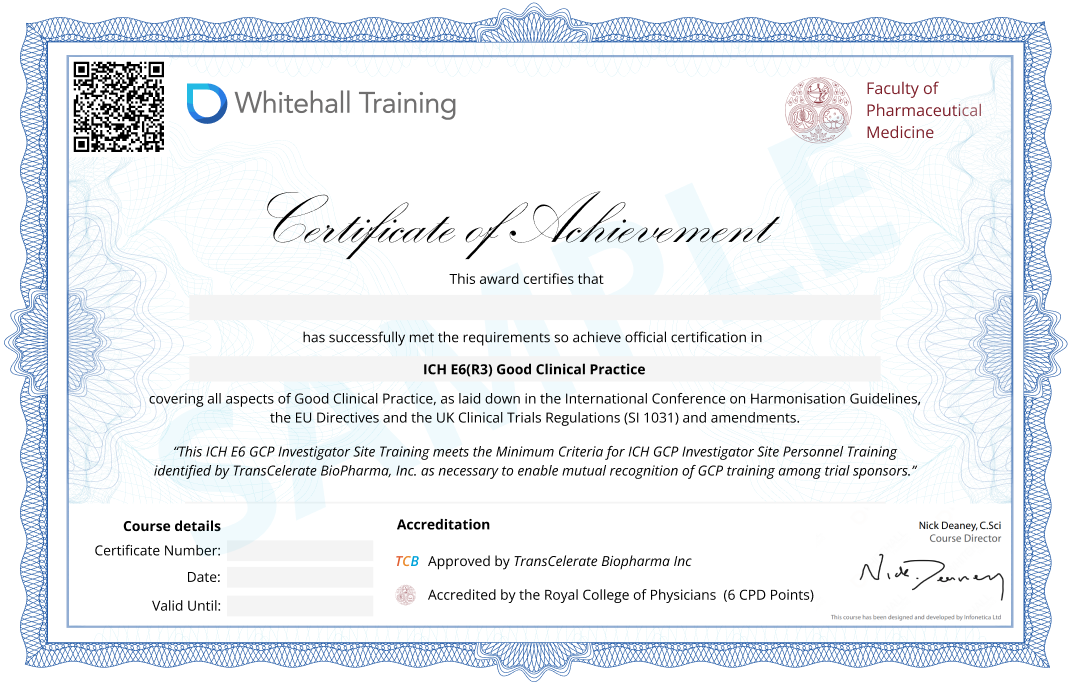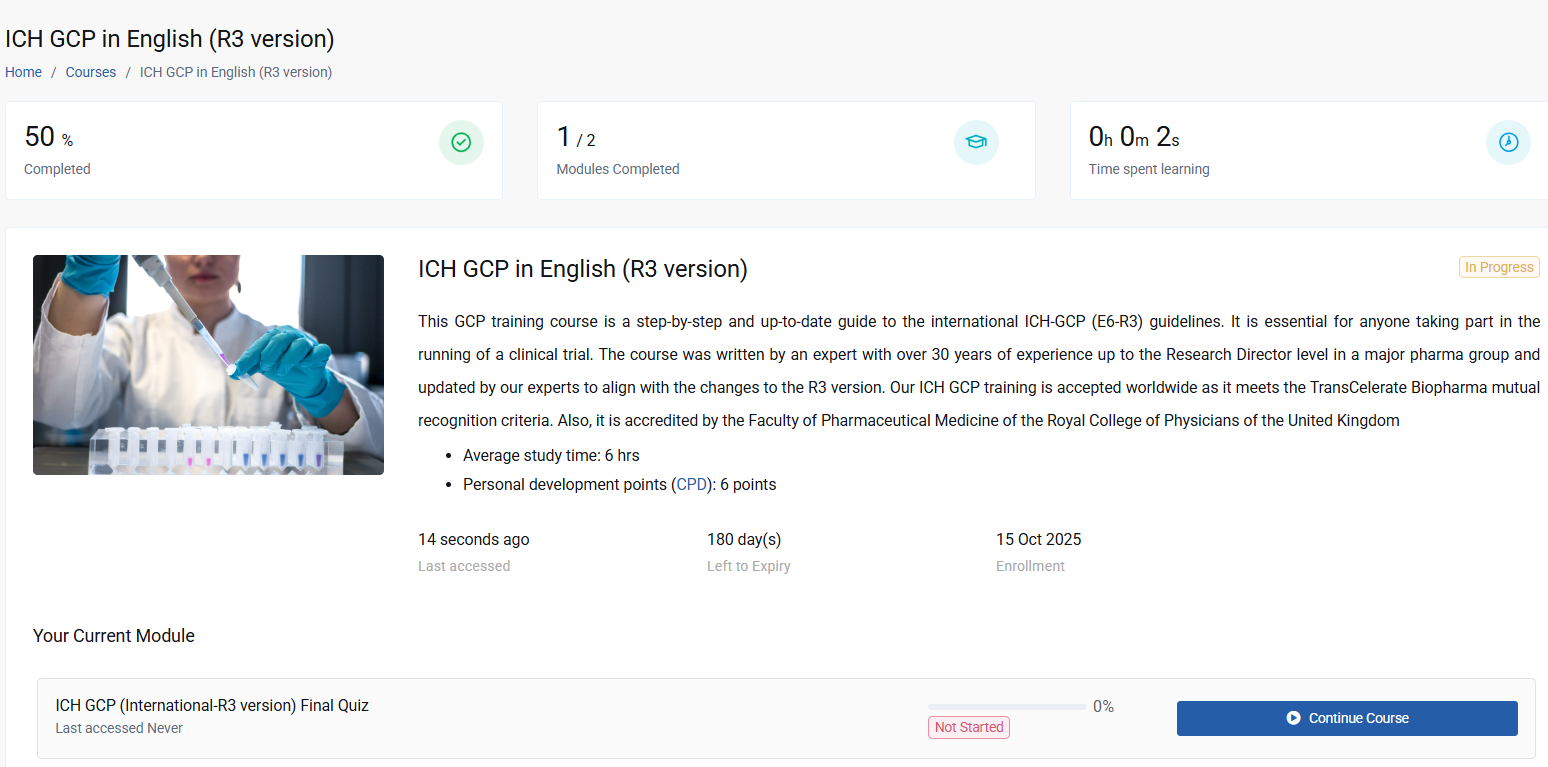I have finalised the demo for the ICH-GCP E6 R3 refresher course. Overall, I liked the content and the interface. I also want to thank Whitehall Train...
About
Escrito por um especialista com mais de 30 anos de experiência até ao nível de Diretor de Investigação num grande grupo farmacêutico, este curso de formação em BPC abrange as diretrizes internacionais ICH-BPC (E6-R3) e cumpre os requisitos de formação para que possa participar em ensaios clínicos internacionais.
Course Syllabus
- A História do GCP: Parte 1
- A História do GCP: Parte 2
- A História do GCP: Parte 3
- A História do GCP: Parte 4
- O que é GCP?
- Os Princípios do ICH GCP: Parte 1
- Os Princípios do ICH GCP: Parte 2
- Pontos de aprendizagem adicionais
- Documentação e Controle de Versão
- Garantia de Qualidade (GQ)
- Recursos Principais: Parte 1
- Recursos Principais: Parte 2
- Introdução: Parte 1
- Introdução: Parte 2
- Introdução: Parte 3
- Introdução: Parte 4
- Introdução: Parte 5
- Introdução: Parte 6
- Introdução: Parte 7
- Introdução: Parte 8
- Introdução: Parte 9
- Responsabilidades da Autoridade Reguladora
- Responsabilidades da CEI
- Formulários de Consentimento Informado do Sujeito (TCLE) Parte 1
- Formulários de Consentimento Informado do Sujeito (TCLE): Parte 2
- Composição, Funções, Operações, Procedimentos e Registros
- Interações do IEC com patrocinadores e pesquisadores
- Introdução
- Responsabilidades do Investigador
- Qualificações e acordos do investigador
- Recursos adequados
- Cuidados médicos de participantes de ensaios clínicos: Parte 1
- Cuidados médicos de participantes de ensaios clínicos: Parte 2
- Comunicação com IRB/IEC
- Conformidade com o Protocolo
- Produtos medicinais experimentais
- Procedimentos de randomização e desmascaramento
- Consentimento Informado: Introdução
- Consentimento Informado: A Discussão sobre o Consentimento
- Consentimento Informado: Sujeitos que Não Sabem Ler ou Escrever
- Consentimento Informado: Menores e Sujeitos “Mentalmente Incompetentes”
- Consentimento Informado: Sujeitos Incapacitados
- Consentimento Informado: Atualização do Consentimento
- Registros e Relatórios: Introdução
- Registros e Relatórios: Arquivos do Local de Estudo
- Registros e Relatórios: Atualizações e Emendas
- Registros e Relatórios: Documentos de Origem
- Registros e Relatórios: Informações Financeiras
- Registros e Relatórios: O Formulário de Registro de Caso
- Registros e relatórios: registro de dados do sujeito
- Término prematuro ou suspensão de um julgamento
- Relatórios de progresso e relatórios finais por investigador
- Responsabilidades do Investigador
- Introdução: Parte 1
- Introdução: Parte 2
- Introdução: Parte 3
- Gestão da Qualidade: Parte 1
- Gestão da Qualidade: Parte 2
- Gestão da Qualidade Parte 3
- QA e QC (Garantia de Qualidade e Controle de Qualidade): Introdução
- QA e QC (Garantia de Qualidade e Controle de Qualidade): Procedimentos Operacionais Padrão
- QA e QC (Garantia de Qualidade e Controle de Qualidade): Acordos e Contratos
- Organizações de pesquisa contratada
- Projeto de teste
- Gestão de Testes: Introdução
- Gestão de Testes: Gestão de Dados
- Gestão de Testes: Dados Eletrônicos
- Gestão de Ensaios: Manutenção de Registros
- Seleção de Investigadores: Introdução
- Seleção do Investigador: Permissões
- Seleção de Investigadores: Responsabilidades
- Seleção de Investigadores: Compensação
- Financiamento
- Notificação/Submissão às Autoridades Reguladoras
- Confirmação de revisão pelo IRB/IEC
- Informações sobre IMP
- Fabricação, embalagem, rotulagem e codificação de produtos experimentais: Parte 1
- Fabricação, embalagem, rotulagem e codificação de produtos experimentais: Parte 2
- Fornecimento e manuseio de produtos investigacionais
- Acesso ao registro
- Manuseio de Dados I
- Manuseio de Dados II
- Manuseio de Dados III
- Manuseio de Dados IV
- Manuseio de Dados V
- Manuseio de Dados VI
- Programação Estatística e Análise de Dados I
- Programação Estatística e Análise de Dados II
- Manutenção e retenção de registros
- Auditoria e Inspeção
- Não conformidade
- Término prematuro ou suspensão de um julgamento: Parte 1
- Término prematuro ou suspensão de um julgamento: Parte 2
- Relatórios de estudos/ensaios clínicos
- Ensaios multicêntricos
- Introdução
- Governança de Dados Parte 1
- Governança de Dados Parte 2
- Manter os cegos
- Ciclo de Vida de Dados I
- Ciclo de Vida dos Dados II
- Ciclo de Vida dos Dados III
- Ciclo de Vida dos Dados IV
- Sistemas Informatizados I
- Sistemas Informatizados II
- Sistemas Informatizados III
- Sistemas Informatizados IV
- Sistemas Informatizados V
- Sistemas Informatizados VI
- Sistemas Informatizados VII
- Introdução
- Monitor
- A Visita de Monitoramento: Parte 1
- A Visita de Monitoramento: Parte 2
- Verificando IMP
- Cumprindo o Protocolo, Emendas, SOP e Orientação
- Verificação do Consentimento Informado
- Formulário de Registro de Caso (CRF) e Documentos Fonte
- Verificando os dados do assunto
- Encerramento da Visita de Monitoramento
- Relatório e Plano de Monitoramento
- Gestão da Qualidade - Monitoramento Centralizado
- Fraude e Má Conduta: Parte 1
- Fraude e Má Conduta: Parte 2
- Introdução
- EAs, RAMs e SUSARs
- Eventos adversos graves
- Susaras
- Eventos adversos de interesse especial
- Relatórios periódicos de segurança
- Introdução
- Estrutura e Conteúdo do Protocolo: Parte 1
- Estrutura e Conteúdo do Protocolo: Parte 2
- Estrutura e Conteúdo do Protocolo: Parte 3
- Introdução
- Estrutura e conteúdo do folheto do investigador
- Apresentações
- Arquivamento
- Documentos a serem apresentados antes do estudo
- Documentos a serem apresentados após o estudo
- Glossary & Abbreviations
- EU Guidance Documents
- ICH Guidance Documents
- US FDA Guidance Documents
- GCP Course Printouts
- Global Competent Authorities List
Our Certified Customers
Learner Rating & Reviews
Frequently Asked Questions
Good Clinical Practice (GCP) training is an essential educational program that equips researchers and clinical trial professionals with the knowledge of ethical and scientific standards crucial for conducting high-quality clinical trials. This comprehensive training covers the internationally recognized guidelines established by the International Council for Harmonisation (ICH).
The primary goals of GCP training are:
- Ensuring the protection of human subjects' rights, safety, and well-being
- Maintaining the integrity and reliability of clinical trial data
- Promoting consistent, high-quality practices across all aspects of clinical research
Our GCP course delves into these critical areas, providing learners with a solid foundation in the principles and practical applications of Good Clinical Practice.
For researchers interested in participating in clinical trials, GCP certification is a necessity.
For those who are simply interested in improving their understanding of the field, GCP certification is highly valuable due to its:
- Ensures compliance with international standards
- Enhances research credibility and quality
- Protects participant rights and safety
- Improves career prospects in clinical research
Our course not only provides certification but also equips you with practical skills to apply GCP principles effectively in your work.
GCP certification is essential for a wide range of professionals in clinical research:
- Clinical Trial Investigators: Principal investigators and sub-investigators responsible for trial conduct at research sites.
- Clinical Trial Staff: Including research coordinators, study nurses, and other site personnel involved in trial management.
- Sponsors and Contract Research Organizations (CROs): Those overseeing trial planning, initiation, and reporting.
- Regulatory Authorities: Officials who monitor and evaluate trial compliance.
- Institutional Review Boards (IRBs) and Ethics Committees: Members reviewing and approving trial protocols.
- Academic and Research Institution Staff: Ensuring adherence to international standards in institutional research.
- NIH-Funded Researchers: All investigators and staff involved in NIH-funded clinical trials.
Our course caters to this diverse audience, providing role-specific insights alongside core GCP principles. The course is also valuable for anyone looking to upskill their research abilities and improve their clinical trials operations.
This GCP training course covers the ICH-GCP (E6-R3) international guidelines and meets the training requirement for you to participate in international clinical trials. Multiple language versions are available. This GCP training course is a step-by-step and up-to-date guide to the international ICH-GCP (E6-R3) guidelines. It is essential for anyone taking part in the running of a clinical trial.
The course was written by an expert with over 30 years of experience up to the Research Director level in a major pharma group. Our ICH GCP training is accepted worldwide as it meets the TransCelerate Biopharma mutual recognition criteria. Also, it is accredited by the Faculty of Pharmaceutical Medicine of the Royal College of Physicians of the United Kingdom. Apart from English, the course is available in German, Bulgarian, French, Italian, Japanese, Polish, Portuguese, Russian and Spanish. We also produce regional versions of this course tailored to the specific regulatory frameworks in Australia, the UK, the US, France, Germany and Latin America.
This course features a clear and visually appealing format, allowing for easy cross-referencing to the ICH-GCP E6 document. It offers valuable insights into the practical application of Good Clinical Practice (GCP) based on the author's extensive experience. Furthermore, it is accredited by the Faculty of Pharmaceutical Medicine of the Royal College of Physicians of the United Kingdom and provides participants with the opportunity to earn 6 CPD points.
Yes, our GCP course is accredited by two industry-leading organisations:
- TransCelerate Biopharma Inc.: A nonprofit organisation collaborating with 20 major pharmaceutical companies. Their mutual recognition program is considered the gold standard in the field of clinical practice.
- The Faculty of Pharmaceutical Medicine at the Royal College of Physicians: The professional membership body for pharmaceutical physicians in the UK, known for setting rigorous standards for research since 1989.
These accreditations ensure our course meets the highest industry and academic standards, offering you a widely recognized certification.
Costs vary depending on the following factors:
- Accreditation: Is the course approved by official organisations, like TransCelerate?)
- Certification: Does the course meet the ICH requirements that allows researchers to participate in international clinical trials?
- Quality of content: Is the course up-to-date, and written by an expert?
- Access: How long are learners able to access the course?
Whitehall Training’s GCP course is £79 due to its:
- Accreditation: It is TransCelerate approved, and accredited by the Royal College of Physicians with 6 CPD points.
- Certification: The course enables users to participate in clinical trials, following the ICH E6(R3) guidelines.
- Quality of content: Our course is written by our Good Clinical Practice expert, Lucy Parker, who has over a decade of experience directing research across large research institutes such as the NHS.
- Access: To support the lifelong learning of our researchers, we provide lifetime access to our course resources.
Buying for a team? We offer 10% off orders of 5 licences at checkout. For discounts on larger orders, please get in touch with our team.




